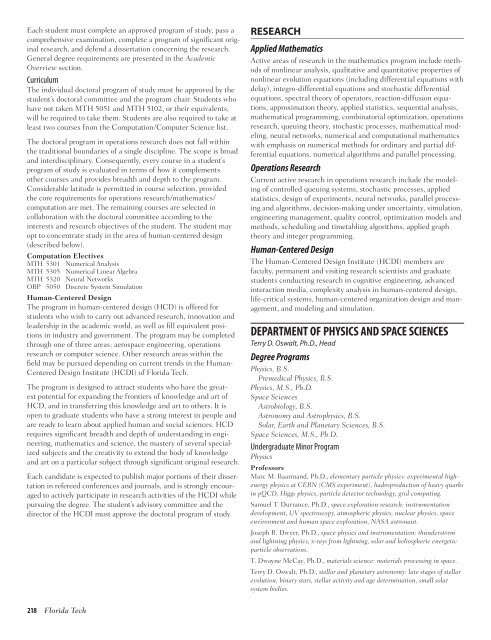2012–2013 UNIVERSITY CATALOG - Florida Institute of Technology
2012–2013 UNIVERSITY CATALOG - Florida Institute of Technology
2012–2013 UNIVERSITY CATALOG - Florida Institute of Technology
You also want an ePaper? Increase the reach of your titles
YUMPU automatically turns print PDFs into web optimized ePapers that Google loves.
Each student must complete an approved program <strong>of</strong> study, pass a<br />
comprehensive examination, complete a program <strong>of</strong> significant original<br />
research, and defend a dissertation concerning the research.<br />
General degree requirements are presented in the Academic<br />
Overview section.<br />
Curriculum<br />
The individual doctoral program <strong>of</strong> study must be approved by the<br />
student’s doctoral committee and the program chair. Students who<br />
have not taken MTH 5051 and MTH 5102, or their equivalents,<br />
will be required to take them. Students are also required to take at<br />
least two courses from the Computation/Computer Science list.<br />
The doctoral program in operations research does not fall within<br />
the traditional boundaries <strong>of</strong> a single discipline. The scope is broad<br />
and interdisciplinary. Consequently, every course in a student’s<br />
program <strong>of</strong> study is evaluated in terms <strong>of</strong> how it complements<br />
other courses and provides breadth and depth to the program.<br />
Considerable latitude is permitted in course selection, provided<br />
the core requirements for operations research/mathematics/<br />
computation are met. The remaining courses are selected in<br />
collaboration with the doctoral committee according to the<br />
interests and research objectives <strong>of</strong> the student. The student may<br />
opt to concentrate study in the area <strong>of</strong> human-centered design<br />
(described below).<br />
Computation Electives<br />
MTH 5301 Numerical Analysis<br />
MTH 5305 Numerical Linear Algebra<br />
MTH 5320 Neural Networks<br />
ORP 5050 Discrete System Simulation<br />
Human-Centered Design<br />
The program in human-centered design (HCD) is <strong>of</strong>fered for<br />
students who wish to carry out advanced research, innovation and<br />
leadership in the academic world, as well as fill equivalent positions<br />
in industry and government. The program may be completed<br />
through one <strong>of</strong> three areas: aerospace engineering, operations<br />
research or computer science. Other research areas within the<br />
field may be pursued depending on current trends in the Human-<br />
Centered Design <strong>Institute</strong> (HCDI) <strong>of</strong> <strong>Florida</strong> Tech.<br />
The program is designed to attract students who have the greatest<br />
potential for expanding the frontiers <strong>of</strong> knowledge and art <strong>of</strong><br />
HCD, and in transferring this knowledge and art to others. It is<br />
open to graduate students who have a strong interest in people and<br />
are ready to learn about applied human and social sciences. HCD<br />
requires significant breadth and depth <strong>of</strong> understanding in engineering,<br />
mathematics and science, the mastery <strong>of</strong> several specialized<br />
subjects and the creativity to extend the body <strong>of</strong> knowledge<br />
and art on a particular subject through significant original research.<br />
Each candidate is expected to publish major portions <strong>of</strong> their dissertation<br />
in refereed conferences and journals, and is strongly encouraged<br />
to actively participate in research activities <strong>of</strong> the HCDI while<br />
pursuing the degree. The student’s advisory committee and the<br />
director <strong>of</strong> the HCDI must approve the doctoral program <strong>of</strong> study.<br />
218 <strong>Florida</strong> Tech<br />
research<br />
Applied Mathematics<br />
Active areas <strong>of</strong> research in the mathematics program include methods<br />
<strong>of</strong> nonlinear analysis, qualitative and quantitative properties <strong>of</strong><br />
nonlinear evolution equations (including differential equations with<br />
delay), integro-differential equations and stochastic differential<br />
equations, spectral theory <strong>of</strong> operators, reaction-diffusion equations,<br />
approximation theory, applied statistics, sequential analysis,<br />
mathematical programming, combinatorial optimization, operations<br />
research, queuing theory, stochastic processes, mathematical modeling,<br />
neural networks, numerical and computational mathematics<br />
with emphasis on numerical methods for ordinary and partial differential<br />
equations, numerical algorithms and parallel processing.<br />
Operations Research<br />
Current active research in operations research include the modeling<br />
<strong>of</strong> controlled queuing systems, stochastic processes, applied<br />
statistics, design <strong>of</strong> experiments, neural networks, parallel processing<br />
and algorithms, decision-making under uncertainty, simulation,<br />
engineering management, quality control, optimization models and<br />
methods, scheduling and timetabling algorithms, applied graph<br />
theory and integer programming.<br />
Human-Centered Design<br />
The Human-Centered Design <strong>Institute</strong> (HCDI) members are<br />
faculty, permanent and visiting research scientists and graduate<br />
students conducting research in cognitive engineering, advanced<br />
interaction media, complexity analysis in human-centered design,<br />
life-critical systems, human-centered organization design and management,<br />
and modeling and simulation.<br />
DePARTMenT OF PHYSiCS AnD SPACe SCienCeS<br />
Terry D. Oswalt, Ph.D., Head<br />
Degree Programs<br />
Physics, B.S.<br />
Premedical Physics, B.S.<br />
Physics, M.S., Ph.D.<br />
Space Sciences<br />
Astrobiology, B.S.<br />
Astronomy and Astrophysics, B.S.<br />
Solar, Earth and Planetary Sciences, B.S.<br />
Space Sciences, M.S., Ph.D.<br />
Undergraduate Minor Program<br />
Physics<br />
Pr<strong>of</strong>essors<br />
Marc M. Baarmand, Ph.D., elementary particle physics: experimental highenergy<br />
physics at CERN (CMS experiment), hadroproduction <strong>of</strong> heavy quarks<br />
in pQCD, Higgs physics, particle detector technology, grid computing.<br />
Samuel T. Durrance, Ph.D., space exploration research: instrumentation<br />
development, UV spectroscopy, atmospheric physics, nuclear physics, space<br />
environment and human space exploration, NASA astronaut.<br />
Joseph R. Dwyer, Ph.D., space physics and instrumentation: thunderstorm<br />
and lightning physics, x-rays from lightning, solar and heliospheric energetic<br />
particle observations.<br />
T. Dwayne McCay, Ph.D., materials science: materials processing in space.<br />
Terry D. Oswalt, Ph.D., stellar and planetary astronomy: late stages <strong>of</strong> stellar<br />
evolution, binary stars, stellar activity and age determination, small solar<br />
system bodies.

















